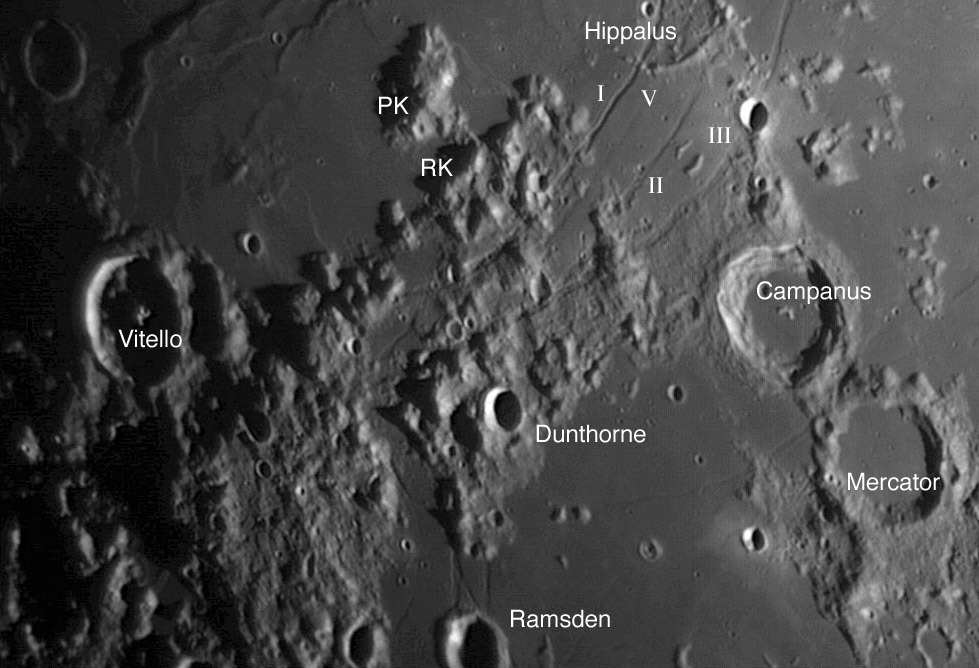Difference between revisions of "August 26, 2017"
(Created page with "__NOTOC__ =Crossing the Kelvin Rectangular Block= Originally published February 7, 2008 <!-- Start of content --> <!-- ws:start:WikiTextHeadingRule:0:<h1> --> <br /> <!-...") |
|||
| (One intermediate revision by the same user not shown) | |||
| Line 8: | Line 8: | ||
<em>image by [mailto:rafaelbenpal@gmail.com Rafael Benavides,] Posadas, Córdoba, Spain</em><br /> | <em>image by [mailto:rafaelbenpal@gmail.com Rafael Benavides,] Posadas, Córdoba, Spain</em><br /> | ||
<br /> | <br /> | ||
| − | We can see features on the Moon, but understanding exactly why they are there is harder. This image by Rafael of the south-eastern corner of the Humorum Basin is a case study in the difficulty in understanding the details. Sandwiched between Vitello, Ramsden, Campanus and Hippalus is the angular Kelvin block (named after the scarp - RK - that defines its north-east side) and a nexus of rilles. The largest set of curved troughs are the Hippalus Rilles (numbered from the [ | + | We can see features on the Moon, but understanding exactly why they are there is harder. This image by Rafael of the south-eastern corner of the Humorum Basin is a case study in the difficulty in understanding the details. Sandwiched between Vitello, Ramsden, Campanus and Hippalus is the angular Kelvin block (named after the scarp - RK - that defines its north-east side) and a nexus of rilles. The largest set of curved troughs are the Hippalus Rilles (numbered from the [https://the-moon.us/wiki/System_of_Lunar_Craters System of Lunar Craters] maps), and a narrower set comes up from Ramsden. The arcuate Hippalus Rilles trace the circular edge of the mare, marking where the crust cracked in response to the subsidence of the central part of the mare due to its weight. I don't know why the Ramsden Rilles exist - perhaps when we get a high resolution altimetry grid we will discover that the mare patch south-east of Ramsden - where its rilles are centered - is domed slightly, and the mare crust fractured like rising bread. One of the Ramsden rilles continues north into the partially flooded floor of a previously unrecognized 70 km wide crater. The crater is half full of Humorum ejecta - is that the central peak refusing to die? The rille seems to continue on in a small bit of mare to the north. Normally a little flat-floored rille like this is interpreted as the surface expression of a dike - a vertical sheet of magma that didn't erupt onto the surface. But I wouldn't expect dikes to curve as much as this does. The Hippalus Rilles seem to converge in this area - III cuts off II, and I bends upward just at its southern end. Hippalus Rille III becomes straight about where it passes II and is faintly traceable to south of Vitello. Why does II stop curving? The southern edge of the basin looks like it probably continues to curve - I wonder what the force was that linearized the rille?<br /> |
<br /> | <br /> | ||
<em>Chuck Wood</em><br /> | <em>Chuck Wood</em><br /> | ||
Latest revision as of 17:44, 13 October 2018
Crossing the Kelvin Rectangular Block
Originally published February 7, 2008

image by Rafael Benavides, Posadas, Córdoba, Spain
We can see features on the Moon, but understanding exactly why they are there is harder. This image by Rafael of the south-eastern corner of the Humorum Basin is a case study in the difficulty in understanding the details. Sandwiched between Vitello, Ramsden, Campanus and Hippalus is the angular Kelvin block (named after the scarp - RK - that defines its north-east side) and a nexus of rilles. The largest set of curved troughs are the Hippalus Rilles (numbered from the System of Lunar Craters maps), and a narrower set comes up from Ramsden. The arcuate Hippalus Rilles trace the circular edge of the mare, marking where the crust cracked in response to the subsidence of the central part of the mare due to its weight. I don't know why the Ramsden Rilles exist - perhaps when we get a high resolution altimetry grid we will discover that the mare patch south-east of Ramsden - where its rilles are centered - is domed slightly, and the mare crust fractured like rising bread. One of the Ramsden rilles continues north into the partially flooded floor of a previously unrecognized 70 km wide crater. The crater is half full of Humorum ejecta - is that the central peak refusing to die? The rille seems to continue on in a small bit of mare to the north. Normally a little flat-floored rille like this is interpreted as the surface expression of a dike - a vertical sheet of magma that didn't erupt onto the surface. But I wouldn't expect dikes to curve as much as this does. The Hippalus Rilles seem to converge in this area - III cuts off II, and I bends upward just at its southern end. Hippalus Rille III becomes straight about where it passes II and is faintly traceable to south of Vitello. Why does II stop curving? The southern edge of the basin looks like it probably continues to curve - I wonder what the force was that linearized the rille?
Chuck Wood
Technical Details
Jan 18, 2008, 19:16 UT. Celestron 11 + Barlow 2X + IR pass filter + Luna-QHY 5 mono camera.
Related Links
Rükl plates 52, 53, 62 & 63
Rafael's website
Yesterday's LPOD: Circles Galore
Tomorrow's LPOD: Humor Me Once More
COMMENTS?
Register, Log in, and join in the comments.



